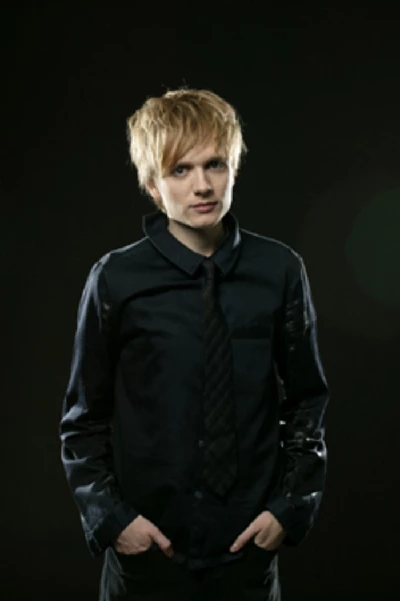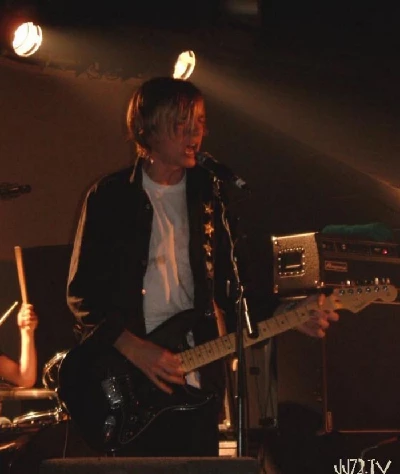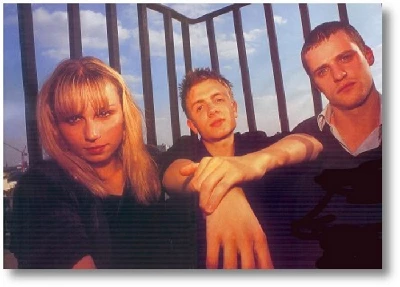JJ72 - Interview Part 1
by Anthony Strutt
published: 23 / 10 / 2005

intro
Dublin-based indie guitar trio JJ72 are about to return with a third album. In the first partof a two part interview, Anthony Strutt talks to the band about it, original bassist Hilary Wood's decision to leave and her replacement Sarah Fox
The Dublin-based indie guitar trio JJ72 released their self-titled debut album on Lakota back in 2000, and then its follow-up 'I to Sky' in 2002. They finished recording their as-yet-untitled third album in the spring of this year, and it is due out shortly. The group has already released two singles from it,'Heat' and 'She's Gone.' Always forceful-sounding, JJ72 have not lost any of their power despite the departure of original bassist Hilary Wood. She has been replaced by beautiful Canadian Sarah Fox. JJ72's other members are vocalist and guitarist Mark Greavey and drummer Feargal Matthews. Pennyblackmusic spoke to the band in a sushi bar before a London gig during their third UK tour of this year. PB : When did you first start playing dates over here ? 1999 ?2000 ? MG :It was 2000. FM : We first started playing together as JJ72 with Hilary our bass player when we were about 17 or 18. Before that Mark and I played with other people. PB : I believe, Mark, that you were originally a violin player. What attracted you to the violin ? MG : I was 6 and my parents brought me a guitar and I had seen someone play a violin and for some reason I thought it looked better. Silly decision ! I didn't know it would be another 6 years before I could play anything on it, but I stuck with it. It was worth it because it put melodies into my head. PB : So can you still play it ? MG : I haven't for years. PB : But it got you wanting to play a stringed instrument? MG : It did. I was playing in orchestras. I was in a youth one. It was a bit messy but when everyone played properly there was apower to it that made me want to put music together. Some of the greatest melodies are really simple and, as a teenager, I thought that, as melody is so simple, I could make up some of my own. I thought that I probably couldn't write a symphony maybe, but maybe a rock song (Laughs). That's when I started playing guitar and then started writing. PB : Did you think by doing music that this might be a good way for to get away from Ireland or did you just want to do music? MG : No, it was just because of music. It's the real issue for me from the age of 15 up until now and I hope it continues to be that way. It just feels right. It feels like the best outlet for my soul I suppose. PB : How does it all work ? Do you write the words and do the others come in with the music ? MG :I write the songs. I write the music and melody, and then bring in each song to these guys. Sarah will add her bass parts to it and Fergal will change around the rhythm or whatever. If I wrote songs by myself, they would just be so and so. It would be like I was a singer/songwriter. I would bore people to death, but luckily I have the band's input to change things. PB : Would you say when you first formed the band up until point that your recorded the first album that your sound had changed a lot, or did you pretty much know what you wanted to do and just got on with it ? MR : We always knew what we wanted to do. Our influences were really, really strong. We wore them very much on our sleeve. We looked to what was the normal at the time and grunge rock. We were into Sonic Youth, Nirvana and the Smashing Pumpkins. That was our first love, and for a lot of people of our age, but the difference between us and them was that we went and formed a band. PB : You must have been about 10 when that was going on. Did you get to see any of it ? MR : I was about 11 when Nirvana kicked off. We were just starting to get into music properly. FM : Then there was Pearl Jam and Mudhoney and then the Pumpkins came along. We were well informed. There was no problem there. MR : Then there was the Britpop thing in '95. We soaked all of that up. FM : Also, when you're a teenager, you're not afraid to admit to listening to the music of your parents. We liked Elvis and people like that as well. PB : Was it quite a shock to you when you first started to sing, Mark ? You have all these really quiet melodies, but when you sing out comes this really fierce, powerful vocal ? MR : When, I first started singing, I didn't know how my voice was going to work. I just wanted to sing like Kurt Cobain like most teenagers wanted to at the time. PB : Dreadful guitar player though. MR : Yeah, dreadful. PB : He couldn't remember a thing. MR : Good, but terrible. He was good at what he did but he just.... PB : Couldn't remember. MR : When I started to sing, I sounded like a girl, but a powerful girl (Laughs). FM : Margaret Thatcher (Laughs). PB : I believe you were discovered by your record label in a pub. I have never heard of your label, Lakota Records, beyond JJ72. Is it a Dublin label ? FM : We were playing a little club called The 13th Floor in Dublin, which is actually on the second floor. The engineer who was working that night at the gig rang the people at Lakota, who are based in Dublin, and told them to come and see us. We played a few more gigs after that and they came to see us again and then it turned out that they wanted to sign us. That was about 1997. It was about a year after we finished school. and that year we went and just gigged and did demos for them. SM : It was a long time ago. FM : The label also have a band called Eightball on their roster. They have had bands come and go. Jubilee Allstars and Beat Glider are two others. MR : They are licensed by Sony. PB : Were they supportive ? They didn't try and change your sound ? MR : No, they were happy with our output. PB : They say that you have your whole lifetime to write a first album, but then it gets harder. How long did it take to write the first record and to record it ? MR : The earliest songs on it were written when I was 16, but we didn't record the album until I was 18 or 19. It made sense at the time. It still does. PB : Were you shocked that over here in the UK you took off straight away, whereas in Ireland you had a slower build up? MR : Yeah, we were. We did a demo, the original version of 'Oxygen', with this guy who became our sound engineer and live engineer. He is really, really good. He is the Cure's live guy. We then put some strings on it and Mark Radcliffe played it. It made single of the week on Radio 1. We never knew what Radio 1 was because we never listened to it before, but we were told that it was a great thing. After that different magazines wanted to interview us. To be honest, due to our youthfulness, we thought that that was what happened to all bands, but it just escalated and before we knew it we were on 'Top of the Pops'. PB : Mark, on the MTV show 'Planet Rock Profiles' you said that your first album didn't mean as much to you as the second one. Was that because yout first one was written over a longer period of time and you were still just learning your craft ? MR : The art form is all about trying too learn how to kind of express yourself in a controlled kind of way. I don't want to sound boring like an accountant or something, but on the first album there were songs on it which were perhaps a bit too wild, or what not, and we ended up with songs that had to be there just because of the emotion involved. On the second album a lot more thought went into it. It was more controlled you know. PB : My first impression of 'I to Sky' was that it reminded me of The Cure in places. It is quite gothic. I would imagine your audience is a bit on the dark side what with liking Nirvana. MR : Yeah, we originally attracted a lot of early Manic Street Preachers fans as well. There was a bit of a gothic thing going on, as well.'Half Three', one of the tunes on the second album, is very Cure. The riff on it is just like that on 'Sinking' from their 'Head on the Door' LP which we are really proud of. We have always pursued our heroes' ideology and nailed it on that album. Billy Corgan of the Smashing Pumpkins came to a gig in Chicago and when we were recording the second LP he was on the phone to Flood 'I to Sky' producer'-Ed) and he said "I like them.I really like the way they wear their influences on their sleeve." We are really proud that we do that. PB : Everyone is influenced by the past anyway. Did you feel blown away when you worked on that second album because you worked with the Pumpkins production team on that one ? FM : We were thinking that we would have been but we got on so well with the guys that we ended up taking the piss out of each other and having fun. It was never deadly seroius. We talked about music a lot. PB : Is the new album finished ? SF : Oh, yeah ! Ages ago. The album is finished and mastered. PB :. When Hilary left did you feel for a while that you wanted to stop too or did you always know that you still wanted to do it ? FM : There was never a doubt there. We knew we wanted to do it. It wasn't a shock. We knew that Hilary didn't want to do it anymore. When she left, it was planned and organised. There was never a doubt there. We found Sarah really quickly. We tried other bass players and they were were prepared to join JJ72 and to fit in with what happened before. With Sarah, it was, however, plain to see that she would bring in her personality to the band so it was like it was like a new band almost. PB : (To Sarah) I believe you're from Canada originally. How did you end up in Dublin ? SF : I was living in London and I went to Dublin for a weekend... PB : And stayed. SF : Yeah, I love it there. PB : People have said your image looks more rock. Is that your background? SF : Yeah, definitely. I'm a rocker. PB : As in heavy metal ? SF : I like metal quite a lot, but in my musical beginning I was a Goth (Laughs), so, yeah, so I suppose I guess I have a different style of bass playing than Hilary. PB : You do. There was a two and a half year gap between your last London show and you first show here this year at 93 Feet East. You lost Hilary and gained Sarah. Was it easier writing the new songs or had some of them been around for a while ? MR : We had some ideas knocking around, but this stuff, was written in a different way. I got the parts together at home, brought them into the rehearsal room and then we reconstructed them together. With the lyrics I didn't try to sit down and write them as poetry as I had done in the past. I wasn't lazy about the lyrics but I ad libbed most of them over the music so they would go with the music more. There's more of a driving force to this especially with the new rhythm going on, I think the songs have a life and an energy. It wasn't based on just what was going on in my head anymore. It was based on the feelings of the band more, and then I brought my feelings into that. I think that worked worked for the forthcoming album. I think you can tell that the music is not so bombastic. There was always a touch of going up to eleven in parts before. This album's more controlled, but in a really good way, not in a boring Travis way. The second part of this interview will be follow in the next edition
Picture Gallery:-


interviews |
|
Interview Part 2 (2005) |

|
| In the second part of our two part interview, JJ72 talk to Anthony Strutt about their forthcoming and long-awaited third album |
live reviews |
|
93 Feet East, London, 18/5/2005 |

|
| Back after a two and a half year break and with a new bassist, Anthony Strutt watches Irish indie guitar trio JJ72 play an explosive set of old abd new songs at London's 93 Feet East |
features |
|
Profile (2002) |

|
| Last summer, in clubs and at gigs around London, I began seeing skinny, fashionably dishevelled-looking youngsters wearing black tee shirts simply inscribed ‘JJ72.’ By the time I had figured out that |
reviews |
|
She's Gone (2005) |

|
| Ultra limited comeback single from Irish trio JJ72, which has a much harder sound than their previous records |
most viewed articles
current edition
In Dreams Begin Responsibilities - #15- On Being Dignified and Old aka Ten Tips From Jah Wobble On How To Be Happy.Dennis Tufano - Copernicus Center, Chicago, 19/7/2024
Elliott Murphy - Interview
Wreckless Eric - Interview
In Dreams Begin Responsibilities - #16: Living in the Minds of Strangers
Adrian Gurvitz - Interview
In Dreams Begin Responsibilities - #17: Tom Robinson
Norman Rodger - Interview
Chris Spedding - Interview
Penumbra - Interview
previous editions
Heavenly - P.U.N.K. Girl EPIn Dreams Begin Responsibilities - #5 - ‘We all have good intentions/ But all with strings attached’: Music and Mental Health Part 2
Trudie Myerscough-Harris - Interview
Allan Clarke - Interview
Dwina Gibb - Interview
Joy Division - The Image That Made Me Weep
Beautiful South - Ten Songs That Made Me Love...
Jimmy Nail - Interview
Nerve - Interview
One Thousand Violins - Interview
most viewed reviews
current edition
Groovy Uncle - Making ExcusesPhilip Parfitt - The Dark Light
Hawkestrel - Chaos Rocks
Jules Winchester - The Journey
Deep Purple - =1
Bill Wyman - Drive My Car
Ross Couper Band - The Homeroad
Popstar - Obscene
John Murry and Michael Timmins - A Little Bit of Grace and Decay
Splashgirl and Robert Aiki Aubrey Lowe - More Human
Pennyblackmusic Regular Contributors
Adrian Janes
Amanda J. Window
Andrew Twambley
Anthony Dhanendran
Benjamin Howarth
Cila Warncke
Daniel Cressey
Darren Aston
Dastardly
Dave Goodwin
Denzil Watson
Dominic B. Simpson
Eoghan Lyng
Fiona Hutchings
Harry Sherriff
Helen Tipping
Jamie Rowland
John Clarkson
Julie Cruickshank
Kimberly Bright
Lisa Torem
Maarten Schiethart